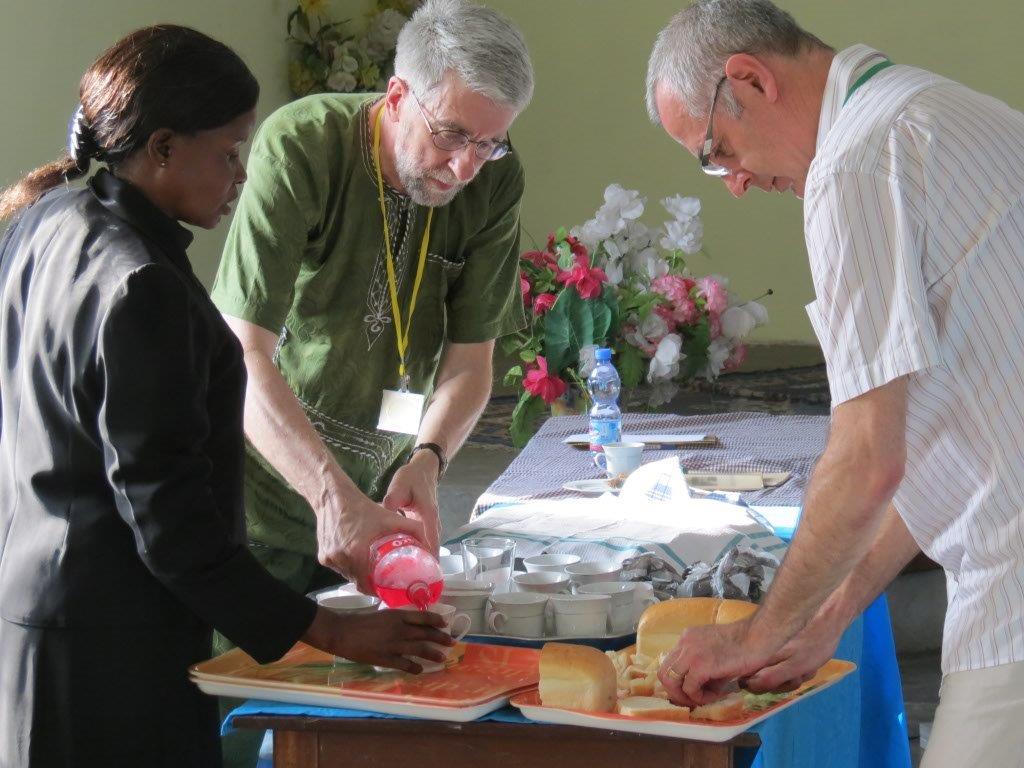Kinshasa, DR Congo – The Francophone Mennonite Network, working under the auspices of Mennonite World Conference, attempts to foster relationships and projects among French-speaking Mennonites from three continents. The first consultation on theological education among francophone Mennonites was held at the “Centre Universitaire de Missiologie” in Kinshasa (26-28 February 2014).
Forty-five participants came from nine different countries: Benin, Burkina Faso, Canada (Quebec), Chad, Congo, France, Ivory Coast, Switzerland and the United States. Opening and closing worship services were attended by representatives from the numerous Mennonite congregations in Kinshasa.
Informal conversations within the network have often focused on the importance of theological education in relation to Mennonite identity. In Africa, the Congolese Mennonites sponsor several Bible Institutes, and in Europe, the French-language department at the Bienenberg Theological School in Switzerland offers the equivalent of one year of seminary-level classes in its continuing education program.
This means that no French-language Mennonite theological school offers the possibility of a seminary degree, and that many pastors, preachers and elders are trained in interdenominational Evangelical institutions in Africa, Canada or Europe. For this reason, representatives from seminaries or schools where Mennonites study or teach (Montreal, Paris, Kinshasa, Abidjan, Ndjaména,and Cotonou) were invited to take part in the consultation.
The Democratic Republic of Congo is the only country with a large number of French-speaking Mennonites (235,000). Otherwise, French-speaking Mennonites are usually quite small minorities in their countries. Through the efforts of the network, francophone Mennonites are beginning to develop cooperative relationships. Nevertheless, most of the people present at the consultation had never met each other and an important part of the consultation was used for participants to get to know each other and their respective contexts in relation to theological education. This was done by each context responding to several questions:
Each morning of the consultation included a presentation for consideration and discussion.
The consultation was effective in helping participants to envisage the potential of the Francophone network. Those present were already aware of the need for collaboration and discussion to help discern concrete possibilities. The importance of theological education in a Mennonite perspective was strongly affirmed, for the good of the church and her mission within the world. The non-Mennonite schools all expressed positive interest in having a Mennonite perspective more present in their curricula. The sociopolitical context of several countries represented contributes to actively seeking a theology that puts peace, reconciliation and forgiveness at the centre of a curriculum. These schools invited Mennonites to help make such a perspective part of their teaching programs.
A continuation committee and four working groups were put into place to explore different avenues of collaboration: the development of on-line courses, upgrading libraries, the development and publication of French-language resources and materials, teacher exchanges, etc. Another consultation will be planned for 2016 somewhere in Africa. If possible, participants who will be at the MWC gathering in Harrisburg, Pennsylvania (July 2015) will plan a gathering.
 The consultation was also an expression of international Mennonite sharing and reciprocity. Congolese Mennonites furnished major administrative and logistical leg-work, a place to meet, good meals, fellowship and wonderful hospitality. Various organizations contributed financially to make the gathering possible: Africa Inter-Mennonite Mission, Eastern Mennonite Missions, the Swiss and French Mennonite mission agencies, Mennonite Mission Network, Witness Canada, MCC, Shalom Foundation, participating schools and churches, as well as individual participants.
The consultation was also an expression of international Mennonite sharing and reciprocity. Congolese Mennonites furnished major administrative and logistical leg-work, a place to meet, good meals, fellowship and wonderful hospitality. Various organizations contributed financially to make the gathering possible: Africa Inter-Mennonite Mission, Eastern Mennonite Missions, the Swiss and French Mennonite mission agencies, Mennonite Mission Network, Witness Canada, MCC, Shalom Foundation, participating schools and churches, as well as individual participants.
Article by Neal Blough
Mundedi Badia Ngundu (left) of DR Congo, presided at the final communion service, assisted by Richard Lougheed of Canada and Max Wiedmer of Switzerland